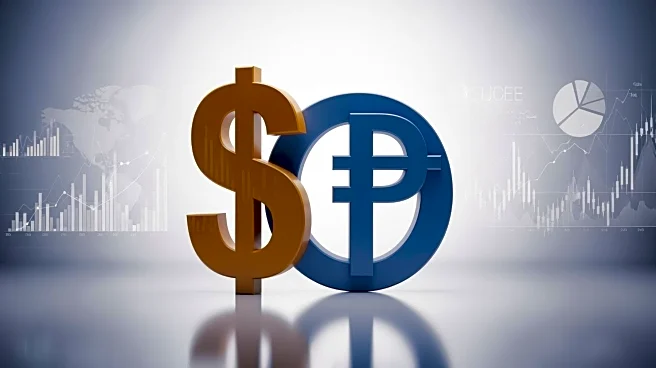What's Happening?
U.S. Treasury Secretary Scott Bessent has announced a $20 billion currency swap to support Argentina's struggling economy. This move is part of a broader intervention by the United States, which includes buying Argentine pesos and expressing readiness
to purchase Argentine sovereign bonds. The intervention aims to stabilize Argentina's currency and bond markets, which have been under pressure due to the country's significant debt levels. Argentina's President Javier Milei, who took office in December 2023, has been criticized for his economic strategy, which includes propping up the peso to reduce inflation. Despite these efforts, financial markets remain skeptical about the sustainability of the current exchange rate, leading to capital flight and depletion of international reserves.
Why It's Important?
The U.S. intervention in Argentina's economy highlights the challenges faced by countries with high debt levels and unstable financial markets. The commitment by the U.S. government to support Argentina's currency and bond markets is significant, as it underscores the geopolitical and economic interests involved. However, the sustainability of this support is questionable given Argentina's massive and unsustainable debt, which accounts for nearly half of the IMF's non-concessional lending globally. The situation poses risks for investors holding Argentine bonds, which are rated as junk by rating agencies. The intervention also reflects broader concerns about the impact of economic instability in Argentina on regional and global markets.
What's Next?
The future of Argentina's economy remains uncertain, with potential consequences for both domestic and international stakeholders. The U.S. commitment to support Argentina's financial markets may face challenges if President Milei fails to win the upcoming congressional election. President Trump's statement that U.S. support is contingent on Milei's electoral success adds another layer of uncertainty. Additionally, Milei's declining approval ratings, driven by corruption scandals and unpopular budget cuts, may further complicate efforts to stabilize the economy. The Argentine government may need to adopt more constructive measures to address the crisis, including increased spending and protections for vulnerable populations.
Beyond the Headlines
The U.S. intervention in Argentina's economy raises ethical and political questions about the role of foreign governments in domestic economic crises. The reliance on external support to stabilize financial markets may undermine Argentina's sovereignty and long-term economic independence. Furthermore, the intervention highlights the limitations of free-market policies in addressing complex economic challenges, as evidenced by Milei's struggles to manage inflation and debt. The situation also underscores the importance of effective governance and policy coordination in achieving sustainable economic recovery.
















